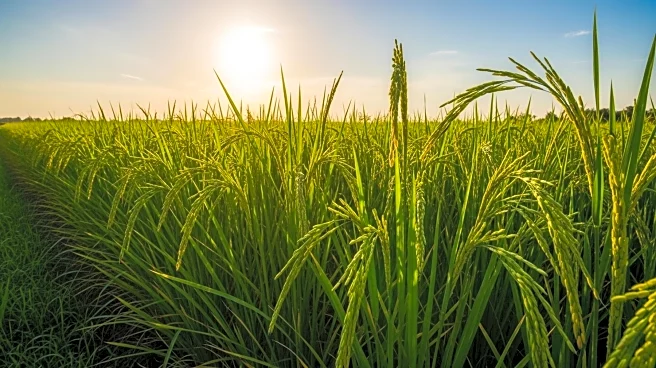What is the story about?
What's Happening?
Indonesia is on the brink of achieving rice self-sufficiency, according to Minister of Agriculture Andi Amran Sulaiman. The country has seen a significant increase in rice production, which is expected to strengthen national food sovereignty. Sulaiman expressed optimism that within the next three months, Indonesia will be able to declare rice self-sufficiency, provided there are no major obstacles. The government has been implementing strategic programs such as developing new rice fields, rehabilitating irrigation systems, and improving farmer welfare. Statistics Indonesia reported that national rice production from January to November 2025 is estimated to reach 33.19 million tons, marking a 12.62 percent increase from the previous year. This surge in production is the highest in seven years, surpassing the previous record of 31.54 million tons in 2022.
Why It's Important?
Achieving rice self-sufficiency is a significant milestone for Indonesia, as it enhances food security and stabilizes prices. With rice production projected to exceed 33 million tons, the availability of this staple food is increasingly secure, reducing its role as a driver of inflation and instead stabilizing prices and purchasing power. This development aligns with projections from international institutions like the Food and Agriculture Organization and the US Department of Agriculture, which estimate Indonesia's rice output to be between 34.6 and 35.6 million tons. The move towards self-sufficiency could reduce dependency on imports, bolster the agricultural sector, and contribute to economic stability.
What's Next?
If Indonesia achieves rice self-sufficiency, it may lead to policy shifts regarding agricultural imports and exports. The government might focus on maintaining production levels and further improving infrastructure to support sustainable agriculture. Additionally, there could be increased investment in technology and innovation to enhance productivity and efficiency in rice farming. Stakeholders, including farmers and agricultural businesses, may benefit from improved market conditions and potential government incentives aimed at sustaining high production levels.
Beyond the Headlines
The push for rice self-sufficiency reflects broader efforts to modernize Indonesia's agricultural sector. This initiative may have long-term implications for rural development, as improved farmer welfare and infrastructure could lead to enhanced living standards in agricultural communities. Furthermore, Indonesia's success in achieving self-sufficiency could serve as a model for other countries seeking to bolster their food security through strategic agricultural policies.















